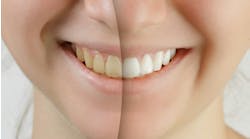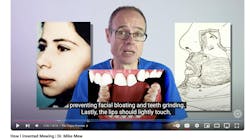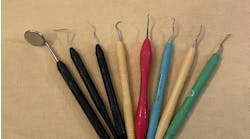CHICAGO--There are many lifestyle factors that can impact a person's health, such as nutrition, amount of sleep, mental stress, tobacco use, and exercise. A study in the May issue of the Journal of Periodontology identifies lifestyle factors that have the most impact on periodontal health.
CHICAGO--There are many lifestyle factors that can impact a person's health, such as nutrition, amount of sleep, mental stress, tobacco use, and exercise. A study in the May issue of the Journal of Periodontology identifies lifestyle factors that have the most impact on periodontal health.
The study followed a group of 219 factory workers in Japan from 1999 to 2003 in an attempt to evaluate the effect of different lifestyle factors on the progression of periodontal diseases. Each worker was evaluated on a list of the following lifestyle factors: physical exercise, alcohol consumption, tobacco use, hours of sleep, nutritional balance, mental stress, hours worked and eating breakfast.
The study followed a group of 219 factory workers in Japan from 1999 to 2003 in an attempt to evaluate the effect of different lifestyle factors on the progression of periodontal diseases. Each worker was evaluated on a list of the following lifestyle factors: physical exercise, alcohol consumption, tobacco use, hours of sleep, nutritional balance, mental stress, hours worked and eating breakfast.
The study found that the number one lifestyle factor that independently impacted the progression of periodontal disease was smoking; hours of sleep closely followed. Over 41% of study participants who showed periodontal disease progression from 1999 to 2003 were current smokers. In addition, lack of sleep was identified as a significant lifestyle factor that may play a role in the progression of periodontal disease.
The study found that the number one lifestyle factor that independently impacted the progression of periodontal disease was smoking; hours of sleep closely followed. Over 41% of study participants who showed periodontal disease progression from 1999 to 2003 were current smokers. In addition, lack of sleep was identified as a significant lifestyle factor that may play a role in the progression of periodontal disease.
The participants who received seven to eight hours of sleep exhibited less periodontal disease progression than those who received six hours of sleep or less. High stress levels and daily alcohol consumption also demonstrated a significant impact on periodontal disease progression.
The participants who received seven to eight hours of sleep exhibited less periodontal disease progression than those who received six hours of sleep or less. High stress levels and daily alcohol consumption also demonstrated a significant impact on periodontal disease progression.
"Our findings are in line with other studies that have identified smoking as a strong lifestyle factor affecting oral health," said study author Muneo Tanaka, DDS. "However, studies that have looked at hours of sleep as an independent factor affecting periodontal health are limited. From this study, we can speculate that shortage of sleep can impair the body's immune response which may lead to the progression of diseases such as periodontal disease."
"Our findings are in line with other studies that have identified smoking as a strong lifestyle factor affecting oral health," said study author Muneo Tanaka, DDS. "However, studies that have looked at hours of sleep as an independent factor affecting periodontal health are limited. From this study, we can speculate that shortage of sleep can impair the body's immune response which may lead to the progression of diseases such as periodontal disease."
"This study points out to patients that there are lifestyle factors other than brushing and flossing that may affect their oral health. Simple lifestyle changes, such as getting more sleep, may help patients improve or protect their oral health," explained Preston D. Miller, Jr., DDS, president of the American Academy of Periodontology. "It is also important to keep these in mind as the body of evidence linking oral disease with systemic diseases continues to grow because ultimately these lifestyle factors might impact a patient's overall health."
"This study points out to patients that there are lifestyle factors other than brushing and flossing that may affect their oral health. Simple lifestyle changes, such as getting more sleep, may help patients improve or protect their oral health," explained Preston D. Miller, Jr., DDS, president of the American Academy of Periodontology. "It is also important to keep these in mind as the body of evidence linking oral disease with systemic diseases continues to grow because ultimately these lifestyle factors might impact a patient's overall health."
For more information, go to American Association of Periodontology.
For more information, go to American Association of Periodontology.





